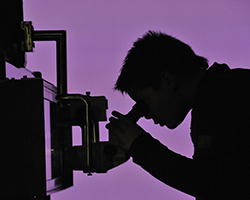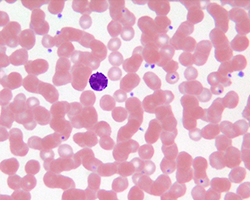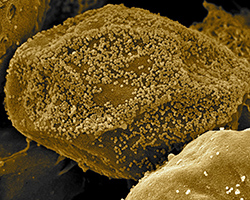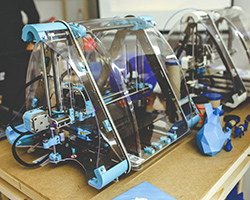Career Path for Douglas Lake
Fast Facts:
- Number of years in school: 20
- Favorite class / subject: Viral Immunology
- Hardest class / subject: Statistics
- First Job: DNA lab technician
- Dream job as a kid: Astronaut
- One word you would use to describe your current job: Satisfying

A dark red blood sample fills a syringe held by a wide-eyed immunology student. He turns and places a drop onto a glass slide, adds a cover slip, and places it under a microscope. Peering through the lens, his eyes widen further. A galaxy of red discs and other odd circular shapes meet his gaze.
Blood is the liquid which courses through our bodies, delivering oxygen and nutrients to our tissues. It contains molecules and cells of our immune system which fight the scariest of diseases. A young Douglas Lake was enthralled by the fact that our blood, and the immune molecules and cells it hosts, are our first defense against diseases that can hurt us.
A Different Path to Medicine
A passion for immunology began to flow through Lake’s veins, alongside his blood. His first look at blood through the microscope started a career-long dedication to his newfound appetite. He knew that this would lead him down a different path than many of his pre-medical classmates.

He noticed that these classmates seemed to only read to get the grades they needed to go to medical school. They didn’t seem to truly enjoy what they were reading. Lake, however, was reading for fun. He devoured knowledge about immunology and how he could use it to make the world a better place.
Aside from immunology, Lake was passionate about helping people on a global scale. While doctors help many people over their careers, they usually do this by helping people one at a time. Lake sought to help many people at once by discovering new ways to fight diseases that exist all over the world.
A Long Path to Immune Research
The road to becoming a world-class researcher is a long one. One of Lake’s first jobs was in a lab that studied HIV. There, Lake helped create antibodies that could block HIV from infecting human cells.

Doug knew how important this job was, as we didn’t have many tools to fight HIV at the time. The lessons he learned in this job would eventually inspire him to develop a COVID-19 test. Armed with his passion to fight diseases at a global scale, Lake went on to work on a PhD. He earned his degree by designing and building antibody fragments. These small antibodies are used to target and prevent disease from spreading.
Throughout his career, Lake has focused his research on studying how the immune system works and finding new ways to use the immune system to test for disease. He would go on to study immune molecules and cells that fight cancer at the University of Arizona Cancer Center before becoming a professor at Arizona State University (ASU). Here at ASU, he continues to study cancer treatments, and creates tests for Valley Fever and COVID-19. Besides spending time in the lab, he teaches the next generation of scientists about disease and immunity.
Finding the Right Path For You

Throughout his life, Lake has always had his eye on new designs and technologies that can make our world a little better. When Lake pulls up to the lab in his electric vehicle he feels like he is driving the future. When he leaves the lab, he heads home to his family, and might spend some time printing out useful tools and trinkets with his 3D-printer. If Lake wasn’t a scientist, he’d probably still be a builder, but maybe he would build buildings instead of molecules so he could see what he is building with his own eyes.
To Lake, finding a career path is not just about working hard, it’s also about finding your passion, and making that your career. If you do this, your career is not really work, and it is much easier to stay happy with what you do. By doing what makes him happy, Lake has found success in his research career. He will continue to do research with the hope of helping many people around the world.
Detect and Protect was created in collaboration with The Biodesign Institute at ASU.
Read more about: Detect and Protect
Bibliographic details:
- Article: Career Path: Douglas Lake
- Author(s): Dr. Biology
- Publisher: Arizona State University School of Life Sciences Ask A Biologist
- Site name: ASU - Ask A Biologist
- Date published:
- Date accessed:
- Link: https://askabiologist.asu.edu/career-path-Doug-Lake
APA Style
Dr. Biology. (). Career Path: Douglas Lake. ASU - Ask A Biologist. Retrieved from https://askabiologist.asu.edu/career-path-Doug-Lake
Chicago Manual of Style
Dr. Biology. "Career Path: Douglas Lake". ASU - Ask A Biologist. . https://askabiologist.asu.edu/career-path-Doug-Lake
Dr. Biology. "Career Path: Douglas Lake". ASU - Ask A Biologist. . ASU - Ask A Biologist, Web. https://askabiologist.asu.edu/career-path-Doug-Lake
MLA 2017 Style

Douglas Lake has spent his career building tools to help detect and fight a variety of viruses.
Be Part of
Ask A Biologist
By volunteering, or simply sending us feedback on the site. Scientists, teachers, writers, illustrators, and translators are all important to the program. If you are interested in helping with the website we have a Volunteers page to get the process started.

